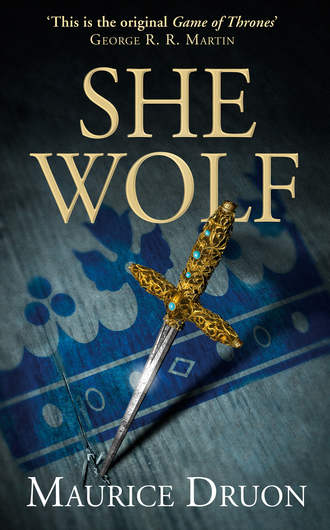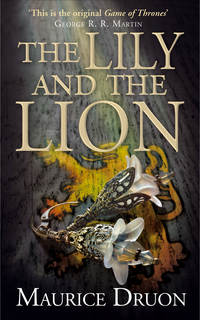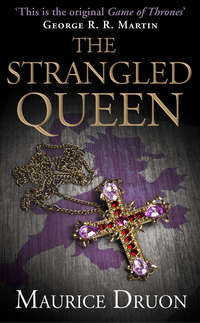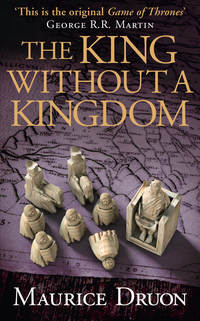
Полная версия
The She-Wolf
He had avoided the temptations of war, had suppressed many of the garrisons in the interior of the country to reinforce those on the frontiers, and had invariably preferred negotiation to foolish military escapades. It was no doubt too soon as yet for the people to grasp the fact that justice and peace were necessarily expensive or, indeed, to understand why the King so ardently required their co-operation. ‘What has happened,’ they asked, ‘to the revenues, to the tithes and annates, to the subventions of the Lombards and the Jews, since less charity has been distributed, no wars have been made, and no buildings constructed? Where has all the money gone?’
The great barons, who were only temporarily submissive, and who had only on occasion, and when faced with the threat of war, rallied round the King from fear, had been patiently awaiting the hour of revenge, and now contemplated the death agonies of the young King they had never loved with a certain satisfaction.
Philippe V, the Long, a lonely man who was too much in advance of his time, died misunderstood by his subjects.
He left only daughters; the law of succession he had promulgated for his own advantage now excluded them from the throne. The crown went to his younger brother, Charles de la Marche, who was as dull of mind as he was handsome of face. The powerful Count of Valois, Count Robert of Artois and all the Capet cousins and the reactionary barons were once again triumphant. At last you could talk of a crusade again, become involved in the intrigues of the Empire, traffic in the price of gold, and watch, not without mockery, the difficulties of the kingdom of England.
For in England an unstable, dishonest and incompetent king, a prey to an amorous passion for his favourite, was fighting his barons and bishops. He, too, was soaking the soil of his kingdom with his subjects’ blood.
And there a Princess of France was living a life of humiliation and ignominy both as wife and queen. She was afraid for her life, was conspiring for her own safety, and dreaming of vengeance.
It was as if Isabella, the daughter of the Iron King and the sister of Charles IV of France, had carried the curse of the Templars across the Channel.
1
‘No One ever Escapes from the Tower of London’

A MONSTROUS RAVEN, HUGE, gleaming and black, nearly as big as a goose, was hopping about in front of the dungeon window. Sometimes it halted, lowered a wing and hypocritically closed its little round eye as if in sleep. Then, suddenly darting out its beak, it pecked at the man’s eye shining behind the bars. His grey, flint-coloured eyes seemed to have a special attraction for the bird. But the prisoner was too quick for it and had already drawn his face back out of danger. The raven continued its constitutional, taking short, heavy hops.
Then the man reached his hand out of the window. It was a long, shapely, sinewy hand. He moved it forward slowly, then let it lie still, like a twig on the dusty ground, hoping to seize the raven by the neck.
But the bird, in spite of its size, could move quickly too; it hopped aside, emitting a hoarse croak.
‘Take care, Edward, take care,’ said the man behind the bars. ‘I’ll strangle you one day.’
For the prisoner had given the treacherous bird the name of his enemy, the King of England.
This game had been going on for eighteen months, eighteen months during which the raven had pecked at the prisoner’s eyes, eighteen months during which the prisoner had tried to strangle the bird, eighteen months during which Roger Mortimer, eighth Baron of Wigmore, Lord of the Welsh Marches, and the King’s ex-Lieutenant of Ireland, had been imprisoned, together with his uncle, Roger Mortimer of Chirk, one-time Justiciar of Wales, in a dungeon in the Tower of London. For prisoners of their rank, and they belonged to the most ancient aristocracy in the kingdom, it was the normal custom to provide a decent lodging. But King Edward II, when he had taken the two Mortimers prisoner at the Battle of Shrewsbury, where he had defeated his rebellious barons, had assigned them to this low and narrow prison, whose only daylight came from ground-level, in the new buildings he had had constructed to the right of the Clock Tower. Compelled, under pressure from the Court, the bishops and even the common people, to commute the death sentence he had first decreed against the Mortimers to life imprisonment, the King had good hopes that this unhealthy prison cell, this dungeon in which their heads touched the ceiling, would in the long run perform the executioner’s office for him.
And, indeed, though Roger Mortimer of Wigmore, who was now thirty-six years of age, had been able to endure the miserable prison, the eighteen months of fog pouring in through the low window and rain trickling down the walls, or, in the summer season, the oppressive, stagnant, stifling heat at the bottom of their hole seemed to have got the better of the Lord of Chirk. The elder Mortimer was losing his hair and his teeth, his legs had swollen and his hands were crippled with rheumatism. He scarcely ever left the oak plank that served him for bed, while his nephew stood by the window, staring out into the light.
It was the second summer they had spent in the dungeon.
Dawn had broken two hours ago over this most famous of English fortresses, which was the heart of the kingdom and the symbol of its princes’ power, on the White Tower, the huge square keep, which gave an impression of architectural lightness in spite of its gigantic proportions, and which William the Conqueror had built on the foundations of the remains of the ancient Roman castrum, on the surrounding towers, on the crenellated walls built by Richard Cœur de Lion, on the King’s House, on the Chapel of St Peter ad Vincula, and on the Traitor’s Gate. The day was going to be hot, sultry even, as yesterday had been. The sun glowed pink on the stonework and there was a slightly nauseating stench of mud coming from the banks of the Thames, which lay close at hand, flowing past the embankments of the moat.1 fn1
Edward, the raven, had joined the other giant ravens on that famous and melancholy lawn, the Green, where the block was set up on days of execution; the birds pecked at the grass that had been nourished by the blood of Scottish patriots, state criminals, and fallen favourites.
The Green was being raked and the paved paths surrounding it swept, but the ravens were unconcerned. No one would have dared harm the birds, for ravens had lived here since time immemorial, and were the objects of a sort of superstition. The soldiers of the guard began emerging from their barracks. They were hurriedly buckling their belts and leggings and donning their steel helmets to assemble for the daily parade which had, this morning, a particular importance for it was August 1, the Feast of St Peter ad Vincula – to whom the chapel was dedicated – and also the annual Feast Day in the Tower.
There was a grinding of locks and bolts on the low door of the Mortimers’ dungeon. The turnkey opened it, glanced inside, and let the barber in. The barber, a man with beady eyes, a long nose and a round mouth, came once a week to shave Roger Mortimer, the younger. The operation was torture to the prisoner during the winter months. For the Constable, Stephen Seagrave, Governor of the Tower,2 had said: ‘If Lord Mortimer wishes to be shaved, I will send him the barber, but I have no obligation to provide him with hot water.’
But Lord Mortimer had held to it, in the first place to defy the Constable, secondly because his detested enemy, King Edward, wore a handsome blond beard, and finally, and above all, for his own morale, knowing well that if he yielded on this point, he would give way progressively to the physical deterioration that lies in wait for the prisoner. He had before his eyes the example of his uncle, who no longer took any care of his person; his chin a matted thicket, his hair thinning on his skull, the Lord of Chirk had begun to look like an old anchorite and continually complained of the multiple ills assailing him.
‘It is only my poor body’s pain,’ he sometimes said, ‘that reminds me I am still alive.’
Young Roger Mortimer had therefore welcomed barber Ogle week after week, even when they had to break the ice in the bowl and the razor left his cheeks bleeding. But he had had his reward, for he had realized after a few months that Ogle could be used as a link with the outside world. The man’s character was a strange one; he was rapacious and yet capable of devotion; he suffered from the lowly position he occupied in life, for he considered it inferior to his true worth; conspiracy offered him an opportunity for secret revenge, and also enabled him to acquire, by sharing the secrets of the great, importance in his own eyes. The Baron of Wigmore was undoubtedly the most noble man, both by birth and nature, he had ever met. Besides, a prisoner who insisted on being shaved, even in frosty weather, was certainly to be admired.
Thanks to the barber, Mortimer had established tenuous yet regular communication with his partisans, and particularly with Adam Orleton, Bishop of Hereford; again through the barber, he had learned that the Lieutenant of the Tower, Gerard de Alspaye, might be won over to his cause; and, through the barber once more, he had set on foot the dilatory negotiations for his escape. The Bishop had promised him he would be rescued by summer. And summer had now come.
The turnkey looked through the spy-hole in the door from time to time, not because he was particularly suspicious, but merely out of professional habit.
Roger Mortimer, a wooden bowl under his chin – would he ever again have a fine basin of beaten silver as in the past? – listened to the polite conversation the barber made in a loud voice for appearances’ sake: the summer, the heat, the weather continued fine, very lucky on the feast of St Peter.
Bending low over his razor, Ogle whispered in the prisoner’s ear: ‘Be ready tonight, my lord.’
Roger Mortimer gave no sign. His flinty eyes, under his thick eyebrows, merely looked into the barber’s beady eyes and acknowledged the information with a wink.
‘Alspaye?’ Mortimer whispered.
‘He’ll go with us,’ the barber replied, attending to the other side of Mortimer’s face.
‘The Bishop?’ the prisoner asked again.
‘He’ll be waiting for you outside, after dark,’ said the barber, who began at once to talk again at the top of his voice of the heat, the parade that was to take place that morning, and the games that would fill the afternoon.
The shaving done, Roger Mortimer rinsed his face and dried it with a towel. He did not even feel its rough contact.
When barber Ogle had gone with the turnkey, the prisoner put both hands to his chest and took a deep breath. With difficulty, he prevented himself shouting aloud: ‘Be ready tonight!’ The words were ringing through his head. Could it really be true that it was for tonight, at last?
He went to the pallet bed on which his companion in prison was sleeping.
‘Uncle,’ he said, ‘it’s tonight.’
The old Lord of Chirk turned over with a groan, looked at his nephew with his pale eyes that shone with a green glow in the shadowy dungeon and replied wearily: ‘No one ever escapes from the Tower of London, my boy, no one. Neither tonight, nor ever.’
Young Mortimer showed his irritation. Why should a man who, at worst, had so comparatively little of life to lose, be so obstinately discouraging and refuse to take any risks whatever? He did not reply so as not to lose his temper. Though they spoke French together, as did the Court and the nobility of Norman origin, while servants, soldiers and the common people spoke English, they were still afraid of being overheard.
He went back to the narrow window and looked out at the parade, which he could see only from ground-level, with the happy feeling that he was perhaps watching it for the last time.
The soldiers’ leggings passed to and fro at eye-level; their thick leather boots stamped the paving. Roger Mortimer could not but admire the precision of the archers’ drill, those wonderful English archers who were the best in Europe and could shoot as many as twelve arrows a minute.
In the centre of the Green, Alspaye, the Lieutenant, standing rigid as a post, was shouting orders at the top of his voice. He then reported the guard to the Constable. At first sight, it was difficult to understand why this tall, pink and white young man, who was so attentive to his duty and so clearly concerned to do the right thing, should have agreed to betray his charge. There could be no doubt that he had been persuaded to it for other reasons than mere money. Gerard de Alspaye, the Lieutenant of the Tower of London, wished, as did many officers, sheriffs, bishops and lords, to see England freed from the bad ministers surrounding the King; in his youthful way he was dreaming of a great career; and, what was more, he loathed and despised his immediate superior, the Constable, Seagrave.
The Constable, a one-eyed, flabby-cheeked and incompetent drunkard, owed his high position in fact to the protection of those bad ministers. Overtly indulging in the very practices King Edward displayed before his Court, the Constable was inclined to use the garrison of the Tower as a harem. He liked tall, fair young men; and Lieutenant Alspaye’s life had become a hell, for he was religious and had no vicious tendencies. Alspaye had indeed repelled the Constable’s advances and, as a result, had become the object of his relentless persecution. From sheer vengeance Seagrave seized every opportunity to plague and vex him. Slothful though he was, this one-eyed man found the leisure to be cruel. And now, as he inspected the men, he mocked and insulted his second-in-command over the merest trifles: a fault in the men’s dressing, a spot of rust on the blade of a dagger, a minute tear in the leather of a quiver. His single eye searched only for faults.
Though it was a Feast Day, on which punishments were generally remitted, the Constable, faulting their equipment, ordered three soldiers to be whipped on the spot. They happened to be three of the best archers. A sergeant was sent to fetch the rods. The men who were to be punished had to take their breeches down in front of the ranks of their comrades. The Constable seemed much amused at the sight.
‘If the guard’s no better turned out next time, Alspaye, it’ll be you,’ he said.
Then the whole garrison, with the exception of the sentries on the gates and ramparts, gathered in the Chapel to hear Mass and sing canticles.
Listening at his window, the prisoner could hear their rough, untuneful voices. ‘Be ready tonight, my lord …’ The ex-Lieutenant of the King in Ireland could think of nothing except that he might perhaps be free this very night. But there was a whole day in which to wait, hope, and indeed fear: fear that Ogle would make some silly mistake in executing the agreed plan, fear that Alspaye would succumb to a sense of duty at the last moment. There was a whole day in which to dwell on all the obstacles, all the hazards that might prejudice his escape.
‘It’s better not even to think of it,’ he thought, ‘and take it for granted that all will go well. It’s always something you’ve never even considered that goes wrong. Nevertheless, it’s also the stronger will that triumphs.’ And yet his mind, inevitably, returned again and again to the same anxieties. ‘In any event, there’ll still be the sentries on the walls …’
He jumped quickly back from the window. The raven had approached stealthily along the wall, and this time it was a near thing that it did not get the prisoner’s eye.
‘Oh, Edward, Edward, that’s going too far,’ Mortimer said between clenched teeth. ‘If ever I’m going to succeed in strangling you, it must be today.’
The garrison was coming out of the Chapel and going into the refectory for the traditional feast.
The turnkey reappeared at the dungeon door, accompanied by a warder with the prisoners’ food. For once, the bean soup was accompanied by a slice of mutton.
‘Try to stand up, Uncle,’ Mortimer said.
‘They even deprive us of Mass, as if we were excommunicated,’ said the old Lord.
He insisted on eating on his pallet, and indeed scarcely touched his portion.
‘Have my share, you need it more than I,’ he said to his nephew.
The turnkey had gone. The prisoners would not be visited again till evening.
‘Have you really made up your mind not to go with me, Uncle?’ Mortimer asked.
‘Go with you where, my boy? No one ever escapes from the Tower. It has never been done. Nor does one rebel against one’s king. Edward’s not the best sovereign England’s had, indeed he’s not, and those two Despensers deserve to be here instead of us. But you don’t choose your king, you serve him. I should never have listened to you and Thomas of Lancaster, when you took up arms. Thomas has been beheaded, and look where we are.’
It was the hour at which his uncle, having swallowed a few mouthfuls of food, would sometimes talk in a monotonous, whining voice, recapitulating over and over again the same complaints his nephew had heard for the last eighteen months. At sixty-seven, the elder Mortimer was no longer recognizable as the handsome man and great lord he had been, famous for the fabulous tournament he had given at his castle of Kenilworth, which had been the talk of three generations. The nephew did his best to rekindle a few embers in the old man’s exhausted heart. He could see his white locks hanging lank in the shadows.
‘In any case my legs would fail me,’ the old man added.
‘Why not get out of bed and try them out a little? In any case, I’ll carry you. I’ve told you so.’
‘Oh, yes, I know! You’ll carry me over the walls and into the water though I can’t swim. You’ll carry my head to the block, that’s what you’ll do, and yours too. God may well be working for our deliverance, and you’ll spoil it all by this stubborn folly of yours. It’s always the same; there’s rebellion in the Mortimer blood. Remember the first Roger, the son of the bishop and the daughter of King Herfast of Denmark. He defeated the whole army of the King of France under the walls of his castle of Mortemer-en-Bray.3 And yet he so greatly offended the Conqueror, our kinsman, that all his lands and possessions were taken from him.’
The younger Roger sat on a stool, crossed his arms, closed his eyes, and leaned backwards a little to support his shoulders against the wall. Every day he had to listen to an account of their ancestors, hear for the hundredth time how Ralph the Bearded, son of the first Roger, had landed in England in the train of Duke William, how he had received Wigmore in fief, and why the Mortimers had been powerful in four counties ever since.
In the refectory the soldiers had finished eating and were bawling drinking songs.
‘Please, Uncle,’ Mortimer said, ‘do leave our ancestors alone for a while. I’m in no such hurry to go to join them as you are. I know we’re descended from royal blood. But royal blood is of small account in prison. Will Herfast’s sword set us free? Where are our lands, and are we paid our revenues in this dungeon? And when you’ve repeated once again the names of all our female ancestors – Hadewige, Mélisinde, Mathilde the Mean, Walcheline de Ferrers, Gladousa de Braouse – am I to dream of no women but them till I draw my last breath?’
For a moment the old man was nonplussed and stared absent-mindedly at his swollen hands and their long, broken nails, then he said: ‘Everyone fills his prison life as best he can, old men with the lost past, young men with tomorrows they’ll never see. You believe the whole of England loves you and is working on your behalf, that Bishop Orleton is your faithful friend, that the Queen herself is doing her best to save you, and that in a few hours you’ll be setting out for France, Aquitaine, Provence or somewhere of the sort. And that the bells will ring out in welcome all along your road. But, you’ll see, no one will come tonight.’
With a weary gesture, he passed his hands across his eyes, then turned his face to the wall.
Young Mortimer went back to the window, put a hand out through the bars and let it lie as if dead in the dust.
‘Uncle will now doze till evening,’ he thought. ‘He’ll make up his mind to come at the last moment. But he won’t make it any easier; indeed, it may well fail because of him. Ah, there’s Edward!’
The raven stopped a little way from the motionless hand and wiped its big black beak against its foot.
‘If I strangle it, I shall succeed in escaping. If I miss it, I shall fail.’
It was no longer a game, but a wager with destiny. The prisoner needed to invent omens to pass the time of waiting and quiet his anxiety. He watched the raven with the eye of a hunter. But as if it realized the danger, the raven moved away.
The soldiers were coming out of the refectory, their faces all lit up. They dispersed over the courtyard in little groups for the games, races and wrestling that were a tradition of the Feast. For two hours, naked to the waist, they sweated under the sun, competing in throwing each other or in their skill in casting maces at a wooden picket.
Then he heard the Constable cry: ‘The King’s prize! Who wants to win a shilling?’4
Then, as it drew towards evening, the soldiers went to wash in the cisterns and, noisier than in the morning, talking of their exploits or their defeats, they went back to the refectory to eat and drink once more. Anyone who was not drunk on the night of St Peter ad Vincula earned the contempt of his comrades. The prisoner could hear them getting down to the wine. Dusk fell over the courtyard, the blue dusk of a summer’s evening, and the stench of mud from the river-bank became perceptible once again.
Suddenly a long, fierce, hoarse croaking, the sort of animal cry that makes men uneasy, rent the air from beyond the window.
‘What’s that?’ the old Lord of Chirk asked from the far end of the dungeon.
‘I missed him,’ his nephew said; ‘I got him by the wing instead of the neck.’
In the uncertain evening light he gazed sadly at the few black feathers in his hand. The raven had disappeared and would not now come back again.
‘It’s mere childish folly to attach any importance to it,’ the younger Mortimer thought. ‘And it’s nearly time now.’ But he had an unhappy sense of foreboding.
But his mind was diverted from the omen by the extraordinary silence that had fallen over the Tower during the last few minutes. There was no more noise from the refectory; the voices of the drinkers had been stilled in their throats; the clatter of plates and pitchers had ceased. There was nothing but the sound of a dog barking somewhere in the garden, and the distant cry of a waterman on the Thames. Had Alspaye’s plot been discovered? Was the silence lying over the fortress due to a shock of amazement at the discovery of a great betrayal? His forehead to the window bars, the prisoner held his breath and stared out into the shadows, listening for the slightest sound. An archer reeled across the courtyard, vomited against a wall, collapsed on to the ground and lay still. Mortimer could see him lying motionless on the grass. The first stars were already appearing in the sky. It would be a clear night.
Two more soldiers came out of the refectory holding their stomachs, and collapsed at the foot of a tree. This could be no ordinary drunkenness that bowled men over like a blow from a club.
Roger Mortimer went to the other end of the dungeon; he knew exactly where his boots stood in a corner and put them on; they slipped on easily enough for his legs had grown thin.
‘What are you doing, Roger?’ the elder Mortimer asked.
‘I’m getting ready, Uncle; it’s almost time. Our friend Alspaye seems to have played his part well; the Tower might be dead.’
‘And they haven’t brought us our second meal,’ the old Lord complained anxiously.











